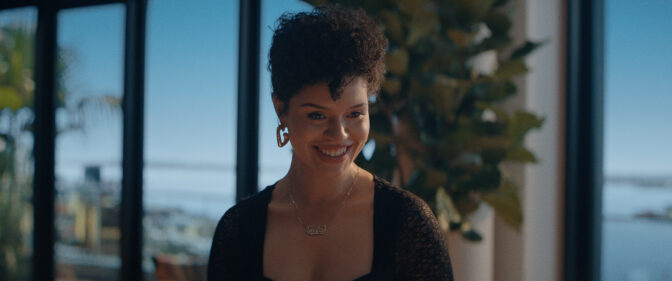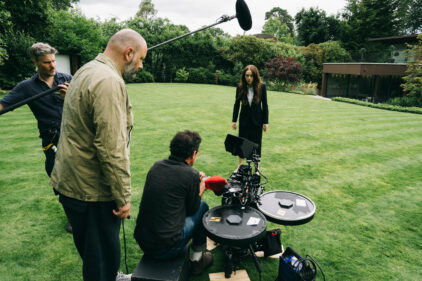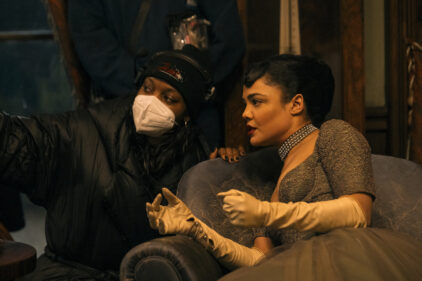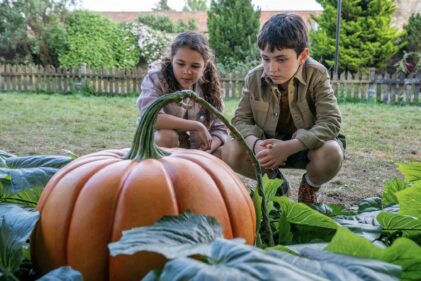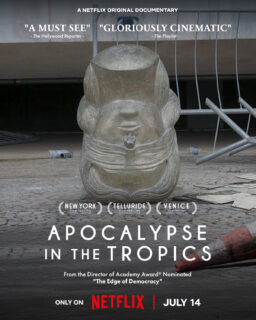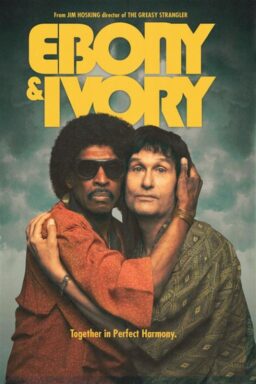There has been no more assured and powerful film debut this year than “Eve's Bayou,” the first film by Kasi Lemmons. Reviewers have compared it to work by Tennessee Williams, Carson McCullers and other Southern Gothic writers; it reminded me of a family drama by Ingmar Bergman. It’s made of memories that still have the power to wound. Its shadows contain secrets that will always hurt.
Lemmons has been working as an actress for 10 years, since she had a small part in Spike Lee’s “School Daze.” Among her 15 roles, she was Jodie Foster’s roommate in “The Silence of the Lambs” and the doomed researcher in “Candyman.” She’s married to Vondie Curtis Hall, himself a gifted actor and director (“Gridlock'd“). Now, with a screenplay she worked on for a decade, she has made a great film; it opens Friday.
The opening words set the ominous tone: “The summer I killed my father, I was 10 years old.” The speaker is Eve Batiste (Jurnee Smollett), the bright and sensitive younger daughter of a charming doctor (Samuel L. Jackson) and his elegant wife (Lynn Whitfield). Eve has an older sister named Cisely (Meagan Good), just on the edge of adolescence, who is the apple of her father’s eye. Jealous Eve looks on with hurt and asks, “Daddy, why don’t you ever ask me to dance?”
The film takes place in Louisiana bayou country, in a black community where Cajun French patois is still sometimes spoken, and modern life still finds corners to harbor fortune-tellers like Eve’s Aunt Mozelle (Debbi Morgan) and the voodoo practitioner Elzora (Diahann Carroll). Filmed with dark beauty and grace by Lemmons and her cinematographer, Amy Vincent, “Eve’s Bayou” builds slowly to an intersection between love, desire and misunderstanding. I am astonished by its subtlety and power.
How does a first-time director make a film of such maturity? I am not exaggerating when I say it reminded me of Bergman’s family dramas, like “Fanny and Alexander,” where adults live in a mysterious world that children perceive in incomplete and frightening ways. It sees its family not in the relaxed, everyday way of “Soul Food” but in the forms of classic family tragedies by Bergman, Chekhov and Eugene O'Neill.
And there is a touch of the magic of Bergman’s cinematographer, Sven Nykvist, in scenes like the one where Aunt Mozelle tells of her unlucky past life; she and Eve stand in front of a mirror, and behind them, in one unbroken shot, the mirror reflects the images she is describing. That is as great a single shot as any movie has given us in a long time – great not just because of the technique, but also because the technique illuminates the material. One morning at the Toronto Film Festival, Kasi Lemmons (she pronounces it “Casey”), small, sparkling and 30ish, sat in a coffee shop and talked about the film. I was surprised to find it was not very autobiographical; I assumed she was drawing from memory, but it is memory transposed in the service of fiction. I’d assumed she was from Louisiana.
“My father has Louisiana in his background. But no, I picked it simply because it was an ideal setting for this story. The bayou is a character in the piece – secretive and beautiful and oppressive. That’s what I wanted, that kind of closeness that is frightening but gorgeous. My Eve-type memories come from Alabama, where my grandmother lived.”
The secrets in this movie, I said, are so deep they’re even secrets from the people themselves. The story doesn’t seem to have been written out from beginning to end, so much as been allowed to accumulate around feelings.
“It started around the characters,” she said. “I wrote short stories about these people. I knew they were members of the same family, and then it all came together and I started to dream about them.”
What emerges is a story based on memories in conflict, seen through the eyes of a child with imperfect understanding of adult behavior. Whether Eve really did kill her father the summer she was 10 depends on many things, including the degree to which we believe in the supernatural.
As a writer, I said, you could have told us just one version – the version you thought happened. Instead, more points of view are introduced; you back up and look at events again.
“That’s absolutely what I set out to do,” she said. “If two people look back at the childhood they shared, they have two completely different takes. For instance, there’s something that happened to me when I was a kid that I can describe – but other people who were there say, `No, you weren’t there.’ OK, is it just because I’ve heard the story that I think I was there? But I can describe it so well! That happens to everybody. There’s something you can remember vividly and your mother says, `Oh, you were too young to remember that. You were just a baby; you must have been 6 months old.’ “
And who knows what really happened on that crucial night that “Eve’s Bayou” leads up to? Whose version is correct? As Eve says in the narration, “Memory is a selection of images, some elusive, others printed indelibly on the brain.” What is remembered is more important than what really happened. . . .
“Right. When something horrifying happens, the mind puts a spin on it because the reality’s too painful. In your mind you flee to a safer position, and that position becomes your memory.”
“Eve’s Bayou” just doesn’t seem like a first film, I said, and I meant it. It has the confidence of an accomplished director. It seems like you already knew how to direct.
“I study films as an audience member,” she said. “But as an actress I was kind of oblivious. I just thought about acting. I went away to film school, and that was helpful.”
Where to?
“The New School of Social Research (in New York), because I couldn’t afford NYU. But it’s a great school; they give you the camera and let you drop-kick it; send you out with a camera and crew and you learn on your feet, which is great. And after (producer) Caldecot Chubb got attached to the movie, I woke up one day and said, `You know, if we’re going to look at first-time directors, then I should direct it. I know this script.’ He wisely said that first I should warm up with a short dramatic piece. So I directed a short with the big crew and the big cameras, and that was really the first time that I asked, `Am I any good at this?’ I think it helps that I have a wild imagination; I’m a visual person.”
How did you come up with the wonderful mirror shot with Eve and Aunt Mozelle, where they’re in front of the mirror and we see her husband and her lover reflected in the background, and then she turns and walks into the past? That shot is beautiful, but it’s not just a pretty picture; it’s an elegant moment of storytelling.
“Well, the scene was always written as a monologue for Debbi Morgan, and when you take a piece of prose to the screen, it’s like, OK – they can’t just stand there and talk. We’ve got to do something visually exciting. I didn’t want to use a trick like blue screen (back projection) or have images superimposed on her face. I wanted something really simple and classy. And I was on a plane with my director of photography, Amy Vincent, going down to Louisiana. And we started talking about it and put it together on the plane. We drew it out: `OK, this is what happens . . . here’s the mirror, she turns and then she walks back toward them . . .’ Amy said, `Well, we’ll need an 11-to-1 zoom, and if we don’t get it, we can’t do the shot.’ It became imperative to make sure everything was at exactly the right angle and distance. Technically it was a bit of a problem, but there are no tricks. We did it with the mirror, the camera and the actors, all in one shot.”
There’s the surface realism of the story, I said, and then a sublevel of the supernatural. Aunt Mozelle is pretty good at telling fortunes; at one point she tells a mother her son is going to be in St. Michael’s Hospital in Detroit next Tuesday. Now that’s pretty good. But then you have Elzora, the voodoo priestess, who is also tapping into something.
“Yeah, she was accurate, too.”
People say if you believe in voodoo, it believes in you.
“In Haiti, you know, somebody waves a stick at you and says you’re going to die, and you shrivel up and die. Voodoo is a very serious religion, and it’s not that I mean to make light of it, but the interesting thing about it, in the film, is the Southernness of it, the casual everyday belief in the supernatural. But who knows what Elzora thinks? When Eve pays her $20 and asks for that event to happen, is she just taking the money and messing with the kid’s head?”
Maybe it’s up to Eve; she’s the one who decides whether the actions become real.
“As for Mozelle,” Lemmons said, “she can’t see her own life. She can look at a stranger and know about the fight she had with her boyfriend last night. But she can’t tell that her husband’s going to die. That’s what drives her crazy; that these tragic events happen in her own life, over which she has no control. She feels she’s cursed.”
A waiter arrived with bran muffins. You are never more than five minutes or two blocks away from a bran muffin in Toronto. We started talking about families. Lemmons’ husband, Vondie Curtis Hall, has a small but crucial role in “Eve’s Bayou” as the one man Aunt Mozelle truly does love. He directed “Gridlock’d” earlier this year, a lively thriller starring Tim Roth and the late Tupac Shakur on an action-packed journey through the Detroit social services labyrinth.
Being a movie director is one of the most time- and soul-consuming jobs in the world. How can one family find room for two of them?
“We have no professional competition,” Lemmons said. “We actually weep with pride for each other. I just can’t believe sometimes that I’m married to him, and I think he feels the same way. Vondie and I are writing a film together right now for him to direct. Let’s see what happens.”

